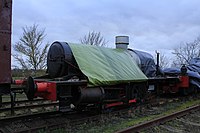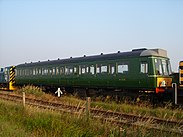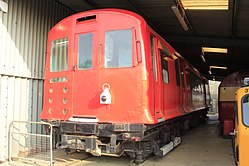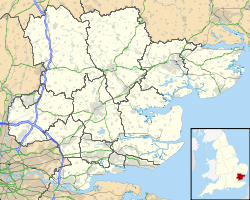Mangapps Railway Museum
 From Wikipedia the free encyclopedia
From Wikipedia the free encyclopedia
 Old Heath Station (Formerly Laxfield on the Mid Suffolk Light Railway). | |
| Established | 1986 |
|---|---|
| Location | Burnham-on-Crouch, Essex, England |
| Coordinates | 51°38′49″N 0°48′30″E / 51.64694°N 0.80833°E |
| Type | Railway museum |
| CEO | John Jolly |
| Website | www |
Mangapps Railway Museum (previously Mangapps Farm Railway Museum) is a heritage railway centre located near Burnham-on-Crouch in Essex, England. The 0.75 miles (1.2 km) of standard gauge running line and museum are owned and operated by the Jolly family assisted by volunteers.[1][2][3]
History
[edit]John Jolly, his wife June and their son James moved from Halesworth in Suffolk to Mangapps Farm near Burnham-on-Crouch in 1984. He already had a large collection of railwayana, and shortly after moving, was asked if he still wanted Brampton waiting shelter, which he had tried to obtain while in Halesworth. It arrived some months later, was set up in his garden and filled with railway artefacts. He built a wooden platform and installed some station furniture. Visitors started to arrive, and suggested that Jolly should hold open days for the public. With the government suggesting that farmers should diversify to generate additional income, he enquired whether the railwayana could meet their requirements. He then obtained an ex-British Railways class 04 diesel shunter, and decided he needed track and other stock to go with it. The shunter arrived on site in April 1987, and over the next two years he obtained two more buildings from the Mid-Suffolk Light Railway, forming the basis for an operational railway.[4]
In 1989 Richard Moore, who owned a half share in Bagnall 0-6-0 saddle tank No. 3061 was looking for a new home for the locomotive, and it moved to Mangapps. Jolly was then approached by John Wilson, the area manager for British Rail at Liverpool Street station, to take part in celebrations to mark the centenary of the Great Eastern Railway’s New Essex Lines network. Rover tickets from Southend Victoria railway station could be bought for £1, and Wilson wanted him to organise a bus link between Burnham-on-Crouch and the farm. Jolly obtained two buses, while Wilson supplied three more, and over 3000 visitors used them over the August Bank Holiday weekend. The event highlighted the need to offer train rides, and after consultation with Major Peter Olver from the Railway Inspectorate, the running line was extended and train rides were offered from Easter 1990. Since then the collection of rolling stock and artefacts has continued to expand.[4]
The collection includes many items with an East Anglian connection, as well as railway signalling and goods wagons.[5]: 91 In addition to the locomotives, there are several coaches including a pantry car built for the London and North Eastern Railway in 1928 and a 1956-built non-corridor coach from the Western Region. Wagons include a boxvan built in 1881 for the Great Eastern Railway, an SNCF ferry van built in 1932 and a fruit van built for British Railways in 1950. Among the eight brakevans on the site is a caboose van built in 1981 for the Canadian Pacific Railway. There is also a vast array of historical signage, badges, and other memorabilia.[4]
Museum collection
[edit]The museum's collection of rolling stock, in common with most preserved railways stock, may be loaned to other railways from time to time.[6]
Steam locomotives
[edit]| Builder | Wheel arrangement | Class | Built | Number and name | Status | Photograph |
|---|---|---|---|---|---|---|
| Fox, Walker and Company | 0-6-0ST | 1878 | 358 Minnie[7]: 86 | On static display. |  | |
| Andrew Barclay Sons & Co. | 0-4-0ST | 1919 | 1619 Toto[7]: 86 | Undergoing restoration. |  | |
| W. G. Bagnall | 0-6-0PT | 1940 | 2613 Brookfield[7]: 86 | Acquired 1993. Designed for a metre gauge railway in Turkey, but completed as standard gauge for the UK. Operational, following a major overhall completed in 2024.[8] |  | |
| BR Brighton | 2-6-4T | BR Standard Class 4 2-6-4T | 1954 | 80078 | Operational, at Mid Norfolk Railway since early 2024.[9] |  |
W.G. Bagnall 0-6-0ST Empress, the first steam locomotive to arrive at Mangapps in 1989, moved permanently to the Pontypool and Blaenavon Railway in September 2018.[10]
Diesel locomotives
[edit]| Origin | Wheel arrangement | Class | Number and name | Year | Status | Photograph |
|---|---|---|---|---|---|---|
| British Rail Swindon | 0-6-0DM | Class 03 | 03 018 (ex D2018)[7]: 87 | 1958 | Under overhaul. |  |
| British Rail Doncaster | 0-6-0DM | Class 03 | 03 081 Lucie (ex D2081)[7]: 87 | 1960 | Repatriated from Belgium in 2004.[11] Undergoing repaint into BR Green. |  |
| British Rail Doncaster | 0-6-0DM | Class 03 | 03 089 (ex D2089)[7]: 87 | 1960 | Operational. |  |
| British Rail | 0-6-0 DM | Class 03 | 03 158 | 1960 | Operational. |  |
| British Rail Doncaster | 0-6-0DM | Class 03 | 03 399 (ex D2399)[7]: 87 | 1961 | Operational. |  |
| British Rail Vulcan Foundry for Drewry Car Co. | 0-6-0DM | Adams Newport | Works number 2252 (Liveried 11104) | 1948 | On Static Display. Cosmetically restored to look like a Wisbech and Upwell Tramway locomotive.[11] |  |
| British Rail | 0-6-0DM | Class 04 | 11103 | 1952 | Under restoration to condition as used on the Wisbech and Upwell Tramway with cowcatchers and skirts. [12] |  |
| British Rail Robert Stephenson & Hawthorns, Darlington for Drewry Car Co | 0-6-0DM | Class 04 | D2325[7]: 87 | 1961 | Operational. (First locomotive to arrive on site in April 1987) |  |
| British Rail | A1A-A1A | Class 31 | 31 105 "Radio Caroline" (named by Rick Wakeman in October 2023)[13] | 1959 | Operational. |  |
| British Rail | A1A-A1A | Class 31 | 31 233 | 1960 | Operational. |  |
Diesel multiple units
[edit]| Origin | Wheel arrangement | Class | Notes | Year | Photograph |
|---|---|---|---|---|---|
| British Rail Pressed Steel, Linwood | Class 117 | DMS no. W51381 (ex-unit 117 310)[7]: 87 | 1960 |  |
Electric multiple units
[edit]| Origin | Wheel arrangement | Class | Notes | Year | Photograph |
|---|---|---|---|---|---|
| British Rail | Class 302 | BDTSO No. 75033 (ex-unit 302 201 Brake, Driving Trailer, Standard class, Open seating)[5]: 91 | 1958 |  | |
| British Rail | Class 302 | BDTSO No. 75250 (ex-unit 302 227 Brake, Driving Trailer, Standard class, Open seating)[5]: 91 | 1960 |  | |
| 1959 Stock | Driving Motor no. 1030 (used in the film Darkest Hour in 2017)[14] This was once part of London Underground's painted 'Heritage' train.[15] | 1959 |  | ||
| 1959 Stock | Trailer no. 2044. This was once part of London Underground's painted 'Heritage' train.[15] | 1959 |  | ||
| London Underground | R38 Stock | Driving Motor no. 22624 (on static display). This was originally Q38 Trailer no. 014178, but was converted in 1950.[15] | 1938 |  |
Inspection vehicles
[edit]| Origin | Wheel arrangement | Class | Notes | Year | Photograph |
|---|---|---|---|---|---|
| Woodings Railcar Co No. 466 | 4w | Canadian Pacific Railway | Inspection Car 3700-84, last based at Abbotsford, British Columbia[16] | c1980 |  |
| Wickham trolley | 4w | British Rail Western Region | Type 4b trolley A14W-PWM2786, last based at Barmouth[16] | 1965 |  |
| Wickham trolley No. 6936 | 4w | British Rail Western Region | Type 27A Mk III trolley PWM3951 | 1955 |  |
In addition to standard gauge stock, the museum also has a service vehicle from Southend Pier Railway. It was built as a passenger car in 1949 by AC Cars of Thames Ditton when the railway was a 3 ft 6 in (1,067 mm) gauge electric line, but was converted to become a service vehicle subsequently. It carried the number 8 when on the pier.[7]: 87 [17]
References
[edit]- ^ Hewitt, Sam (4 April 2018). "Success for Essex 'Railroad Man'". Heritage Railway. ISSN 1466-3562. Archived from the original on 1 March 2024. Retrieved 2 May 2023.
- ^ "Mangapps Railway Museum". www.heritage-railways.com. Archived from the original on 13 September 2019. Retrieved 2 May 2023.
- ^ Lillywhite, Charlotte (12 August 2021). "Founder of Mangapps Railway Museum hopes its new walking route will encourage locals to visit". Burnham and Dengie Nub News. Archived from the original on 5 May 2023. Retrieved 2 May 2023.
- ^ a b c Hewitt, Sam (April 2018). "Success for Essex 'Railroad Man'". Heritage Railway. ISSN 1466-3562. Archived from the original on 1 March 2024.
- ^ a b c Butcher, Alan C, ed. (2009). Railways Restored (13th ed.). Ian Allan. ISBN 978-0-7110-3370-2.
- ^ Courtney, Geoff (30 August 2022). "Banter, memories and tea on menu at Mangapps". Heritage Railway. ISSN 1466-3562. Archived from the original on 4 May 2023. Retrieved 2 May 2023 – via PressReader.
- ^ a b c d e f g h i j IRS (2012). Industrial Locomotives Handbook 16EL. Industrial Railway Society. ISBN 978-1-901556-78-0.
- ^ "Brookfield back in action at Mangapps". Railway Magazine. September 2024.
- ^ "Summer Steam Gala 2024". Mid-Norfolk Railway. 2024. Archived from the original on 24 June 2024.
- ^ "Pontypool and Blaenavon Railway acquire steam locomotive No.3061 Empress". Rail Advent. Archived from the original on 3 September 2024. Retrieved 3 September 2024.
- ^ a b "Locomotives". Mangapps Railway Museum. Archived from the original on 2 March 2024. Retrieved 22 July 2024.
- ^ Foster, Richard (January 2024). "Wisbech Wanderer". Trackside Magazine. No. 30. p. 62.
- ^ Shahrabi, Ben (16 September 2023). "Maldon District: Prog-rock legend Rick Wakeman to unveil 'Radio Caroline' locomotive at Mangapps Railway Museum". Maldon Nub News. Archived from the original on 3 October 2023. Retrieved 1 October 2023.
- ^ Hewitt, Sam (22 March 2017). "Big budget film turns to railway museum for World War Two scenes". Heritage Railway. No. 226. ISSN 1466-3562. Archived from the original on 17 May 2022. Retrieved 2 February 2024.
- ^ a b c Hardy, Brian (2002). London Underground Rolling Stock. Capital Transport. p. 69. ISBN 978-1-85414-263-4.
- ^ a b "Stock List – Other". Mangapps Railway Museum. 2024. Archived from the original on 2 March 2024. Retrieved 22 July 2024.
- ^ "Stock List – Coaching Stock". Mangapps Railway Museum. Archived from the original on 2 March 2024.
